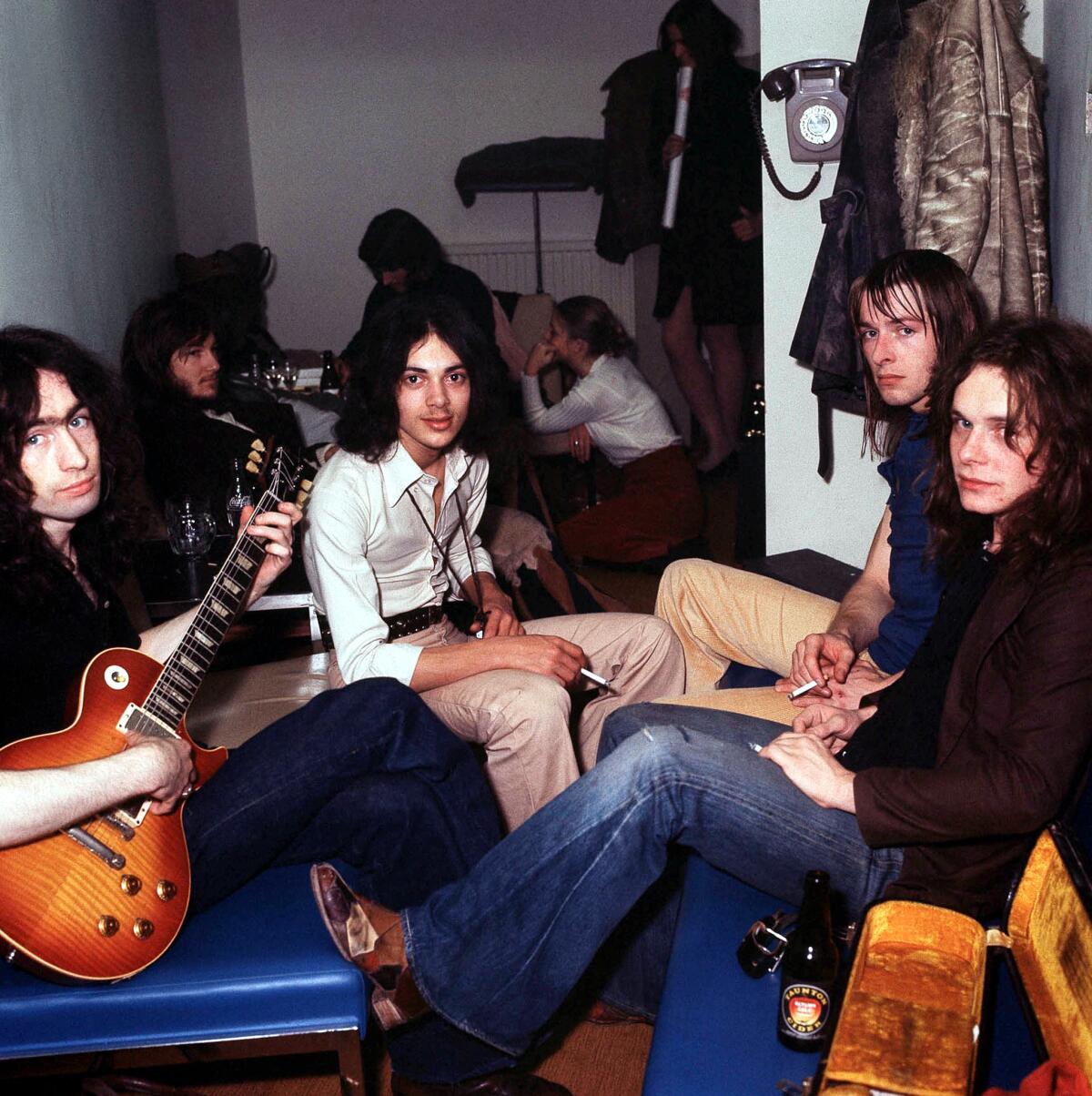Appreciation: Andy Fraser: A bassist whose rumbling sound allowed Free to soar

- Share via
When guitarists die, Elmore James’ “The Sky Is Crying” leaps to mind as a musical line to remember for fans trying to summon what they’ve loved and now will miss.
There’s no blues classic called “The Ground Is Rumbling” to mark the passing of electric bassists -- earth, rather than air, being the medium through which the low frequencies most readily make their way. With the death of Andy Fraser of Free, less than five months after Jack Bruce’s passing, we’ve lost another of the great masters of four strings who came out of the British rock explosion of the 1960s and early ‘70s.
Fraser’s bass playing was far more than a rumbling in the ground. It was often at the forefront of Free, one of the most powerfully elegant, individually outstanding yet perfectly balanced and precisely locked-in rock quartets ever assembled.
Where Bruce and John Entwistle mainly undergirded their bands, Cream and the Who, with magnificent power and propulsion, Fraser’s gift was to amble, skip and dance. His nimble playing, his clean, full tone, and his delight in exploring his instrument’s upper frets were crucial to creating the sense of uncluttered spaciousness and, yes, freedom -- but a keenly disciplined freedom -- that is Free’s hallmark.
It didn’t hurt that the band’s two other ace instrumentalists, guitarist Paul Kossoff and drummer Simon Kirke, were similarly committed to building simple yet nuanced structures, and equally resistent to the busy ornamentation that could only disfigure the sturdy attractiveness of their band’s sonic architecture.
Align those three with one of rock’s strongest, most emotionally expressive blues and soul-schooled voices in Paul Rodgers, and you had four musicians who together just flat-out worked.
Most rock bassists followed the lead of Bill Wyman of the Rolling Stones, forced to make do with excelling in a supporting role. Listening to Fraser with Free, you hear the bass being given equal space and time, all the time.
In a more just world, this assemblage of talent would have gone down in music history as more than an afterthought. Free left its biggest impression on pop culture as a one-hit wonder (the 1970 single “All Right Now” reached No. 4 in the United States), and as a footnote to Bad Co., the popular but much less interesting arena-rock band that Rodgers and Kirke hatched with Mick Ralphs of Mott the Hoople after Free broke up in 1973.
“I always felt that, pound for pound, Fraser had the most talent of the four of us,” Kirke recalled in the booklet of “Molten Gold,” a 1993 Free compilation. The drummer spoke of how Fraser had come up with “All Right Now” moments after a gig that had left the band distressed over its lack of a rousing number to close shows. “He started boppin’ around, singing ‘All Right Now.’ He sat down and wrote it right there in the dressing room. It couldn’t have taken more than ten minutes.”
Fraser, who died Monday in Temecula, Calif., at 62, was one of rock’s great but lamentably quick-burning teen prodigies. A member of John Mayall’s Bluesbreakers at 15, he was just 16 when Free got rolling in 1968, and still shy of 20 when the original lineup issued the last of its six albums in 1972.
His bandmate Kossoff, whose heroin habit was probably the ruination of Free as well as himself, died in 1976 at age 25. Fraser’s post-Free rock efforts proved desultory. Along the way he was infected with HIV, and spoke publicly later in life about being gay and coping with the disease.
What’s left is a recorded legacy highlighted by two superb albums, “Fire and Water” (1970) and “Highway” (1971), encompassing moods and approaches too diverse to easily encapsulate and capturing an alchemy of songwriting and playing that’s better heard than analyzed.
With Fraser and Rodgers combining to write most of the songs, Free could celebrate the simple pleasures of ambling through a cornfield in the drunken fellowship of friends (“Highway Song”), proffer bittersweet homespun philosophy about disillusioning experience (“Bodie”) or bring the listener into a chamber of despair as a man composes his suicide letter (“Soon I Will Be Gone”). Credits on Free albums tend to be sketchy, but that may be Fraser, who also played keyboards, clinching the dirge with sorrowful sheets of sound from a mellotron.
But “All Right Now” means Free will be remembered most for its macho swagger. Fraser’s distinctive bass solo in the jubilant hit song has been noted in his obituaries. It’s a marvel of do-it-yourself, call-and-response, high-low counterpoint. But another, much nastier number in that mold, “Mr. Big,” is probably the pinnacle of his playing.
The lyric, which Rodgers delivers like the bludgeoning it threatens, is a warning to a would-be rival; after that comes a dramatically surging instrumental passage that might be the protagonist’s victory dance. While Kossoff provides a platform played with the lean, tensile drama that was his special signature, Fraser heads off on an extended bass run that bubbles and surges, relaxes momentarily, then surges again until it finally lifts to a peak.
Listen to “Mr. Big,” and you’ll hear Andy Fraser proving that a bass guitar can be an arresting focal point as much as an accompaniment.
More to Read
The biggest entertainment stories
Get our big stories about Hollywood, film, television, music, arts, culture and more right in your inbox as soon as they publish.
You may occasionally receive promotional content from the Los Angeles Times.











